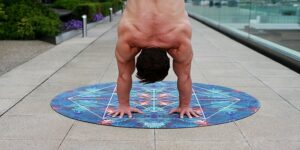Tired of the Same Ol’ People and the Same Ol’ Places? Try This
So you want to make new friends, but you’re not sure where to start?
Trust me, you’re not alone.
You probably have some friends at work, but they talk about work too often for your taste; and they don’t seem to like the same things you do. They’re convenient, but they’re not exactly what you’re looking for.
So where do you find these people?
The good news is that these ideas can work whether you just landed in town or you’ve lived in the area your whole life.
1) Organizations/Groups/Clubs that share your interest
When trying to make new friends, it only makes sense that you would want to find people who have similar interests as you, right?
After all, what would your friendships look like if your “friends” do not share the same interests? How would the interactions be? How desperate would you be if you’re doing things you don’t enjoy just to get someone to spend time with you?
The good news is that there are tons of ways to find people who share your interests and also want to be social.
The most common one is using Meetup.com and finding events in your area that would stand out to you. Meetups are great for a few reasons:
a) These people share at least one common interest with you and you will likely find more as you get to know them.
b) These people are willingly out, and you typically do not go to a Meetup unless you are planning on being social. This means that they are open to conversing with you. This is true for both males and females so feel free to start striking up conversations about the event. It’s an easy icebreaker.
c) Many of these events are recurring so you will have multiple opportunities to meet and build rapport with people in these groups. This relieves the pressure to try and meet too many people at any one event. Instead just focus on meeting a few people each time and start to build out your social circle then. Following up with them after each event will be crucial.
2) Use Social Media to Reconnect with Old Classmates
When not being bombarded with cat memes or silly political nonsense, social media can be an amazing tools for improving your social circle. While sites like Twitter, Instagram and Pintrest are fun, the two best social networks are Facebook and LinkedIn.
The best value of a sites like Facebook or LinkedIn is the ability to keep track of what your friends do after you parted from college, and then to reconnect with people who you haven’t spoken with in a long time.
I have a friend living in Florida who I am reconnecting with now and found out he’s moving to Boston later this year (less than 2 hours from me). He and I will be reconnecting in person in the near future as we have already discussed it at length.
I reconnected with another old college classmate via LinkedIn and are looking to close our first real estate deal together in the near future.
And the best part? Reaching out is simple and low-risk.
You are just typing a message to someone who you have not spoken with in a while to see how they are doing and what they are up to.
What happens if they don’t respond? What have you lost?
NOTHING.
So get out there and reach out to a few people that you’d like to reconnect with. Go do something even as simple as get a drink to catch up. Most people, if they were ever in your circle, will be more than happy to take you up on your offer.
3) Professional Groups Associated With Your Job or Business
If you have to be at a job, you might as well use it to your advantage. Jason Treu, author of Social Wealth, says that Business events are some of the best events for you to go to in order to make new friends.
As an example, I invest in real estate. If you were an investor, you can connect and network with professionals such as realtors, mortgage brokers, title attorneys or other real estate related service providers. And it works with any of those professions as well (i.e a realtor could interact with investors, mortgage brokers and title attorneys).
While similar to Meetups (and sharing some of the key traits, although not necessarily a recurring event) there are additional benefits to professional groups that are less likely in other types of group meetings:
a) There is a natural ice breaker because you can always ask someone if they are a member of the organization, or who they know here, etc.
b) It is an easy place to introduce people and also to have people introduce you. In fact, it is considered common to have introductions made at the event.
c) These people are usually the go-getters in their field. The average people are not spending their free time at events based around work. So these are the people in your field that you will want to work with.
Which brings us to…
d) They give you a chance to get to know people who you can do business with. People typically do business with those they know, like, and trust. You are already in their field, and these events just give you a chance to meet them in a more relaxed setting. You’d be surprised how much one group event can change your professional life. And you can make new friends in the process.
The big caveat is do not be needy at these events. Do not go out there looking for a specific outcome. On the contrary, see how you can help the other people right away. Give them some value first before you even think about yourself. Personally, I recommend trying to introduce them to someone in your network, as the power of a good introduction is underrated.
4) Being a Regular at Key Locations
I have a friend, Z Pasha, a social skills expert, that calls this “geo-farming.” Basically, instead of hopping from place to place, be a regular at certain place that fits your criteria and then mine them for the high quality people you want to attract into your network.
To do this, you need to select highly dense places where attendees would be likely to connect with you, or be the types of people who could potentially show up at some of the prior recommendations in this article (#1 & #3).
Pro Tip: Familiarize yourself with the staff and other regulars there. Not only will it give you all the base benefits of being a regular somewhere (easier access, familiarity etc.), but an enhanced social status for the non-regulars to notice. When people see you friendly with many of the people already there, you obtain a higher status and become someone who everyone wants to know (even if it’s just, “Why does everyone know that guy?”).
5) Access Your Current Sphere of Influence
Whether it’s meeting girls or adding more people to your network, there is nothing more powerful than a warm referral from a friend.
If you are already friends with a friend of someone who you would like to meet, you already have an in. This is far easier than trying to chat up strangers, even in other groups on this list. Because having those common connections gives you instant credibility. Your association with their friend is enough for them to give you a chance themselves.
The good news is that you can easily get an introduction to these people by asking your friend for one. A good friend would be happy to introduce you to another cool person in their network.
6) Parties, Dinner Parties, Other recurring Events and the “+1 rule”
When I first met Christian in New York years ago, he told me that dinner parties were his number one way of building his social circle as well as finding women to date. He also speaks at length about them in “The Girlfriend Activation System.”
He would invite people to his place for dinner and one of the key aspects of it was to have everyone bring just one cool person. You will find that you click with some of these people better than the friend who introduced you.
This concept is also big in the book “Never Eat Alone.”
But this does not have to be for just dinner party settings. In college, we had a weekly football game and one friend brought a new guy from another dorm. We met, we clicked, and now he’s one of my best friends, I speak with him far more often than the guy who introduced us and am going to be the best man at his wedding next month.
The best way to grow your opportunities is the “+1 rule” for your events. Everyone who comes has to bring an interesting person from their network to the event. That way everyone has new people to meet at the party. And then ideally they come back the next time with their own “+1.” You can see where this can easily grow exponentially.
Action Steps:
Do not try to do all 6 of these. Instead, commit to just one or two of these ideas and start to expand your social circle. You will see some great results just by focusing on a few strategies rather than trying to incorporate all of these at once.
So have a dinner party, go to a Meetup, reach out to an old classmate on Facebook or just ask a friend for an introduction.
Doing any of these would be a positive step towards building your social circle. Master one or two of them.
Then do another one…
…then another one.
Eventually, you will start having recurring events and things scheduled on your calendar (i.e. weekly dinner party, a recurring monthly Meetups) and have an amazing social schedule naturally built to fit your lifestyle.













1 Comment
You must be logged in to post a comment Login